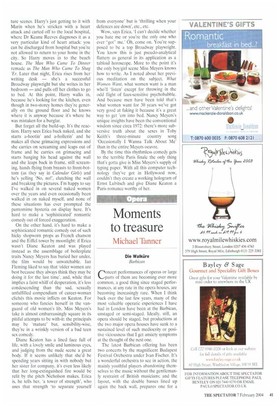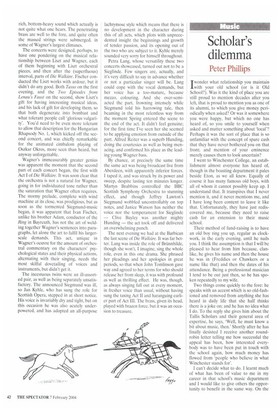Moments to treasure
Michael Tanner
Die Walkiire Barbican
Qncert performances of operas or large arts of them are becoming ever more common, a good thing since staged performances, at any rate in the opera houses, are becoming increasingly rare. When I think back over the last few years, many of the most valuable operatic experiences I have had in London have been at the Barbican, unstaged or semi-staged. Ideally, still, an opera should be staged, but productions at the two major opera houses have sunk to a sustained level of such mediocrity or positive viciousness that I get anxiety symptoms at the thought of the next one.
The latest Barbican offering has been two concerts by the magnificent Budapest Festival Orchestra under Ivan Fischer. It's a wonderful orchestra to see in action, the mainly youthful players abandoning themselves to the music without the gentlemanly restraint of British musicians; and the layout, with the double basses lined up again the back wall, prepares one for a
rich, bottom-heavy sound which actually is not quite what one hears. The penetrating brass are well to the fore, and quite often the massed strings were submerged, in some of Wagner's largest climaxes.
The concerts were designed, perhaps, to have one pondering on the musical relationship between Liszt and Wagner, each of them beginning with Liszt orchestral pieces, and then after the (superfluous) interval, parts of Die Walkiire. Fischer conducted the Liszt works with ardour, but it didn't do any good. Both Tasso on the first evening, and the Two Episodes from Lenau's Faust on the second, show Liszt's gift for having interesting musical ideas, and his lack of gift for developing them, so that both degenerate into bombast and what tolerant people call 'glorious vulgarity'. You'd need to be even more tolerant to allow that description for the Hungarian Rhapsody No. 1, which kicked off the second concert, and was chiefly remarkable for the animated cimbalom playing of Oszkar Okros, more seen than heard, but anyway unforgettable.
Wagner's immeasurably greater genius was apparent the moment that the second part of each concert began, the first with Act I of Die Walkiire. It was soon clear that the orchestra is not a natural for Wagner, going in for individuated tone rather than the saturation that Wagner often requires. The stormy prelude, complete with wind machine at its close, was prodigious, but as soon as the tormented Siegmund-music began, it was apparent that Ivan Fischer, unlike his brother Adam, conductor of the Ring in Bayreuth, has not the art of welding together Wagner's sentences into paragraphs, let alone the art to fulfil his largerscale demands. This act, unique in Wagner's oeuvre for the amount of orchestral commentary on the characters' psychological states and their physical actions, alternating with their singing, needs the most skilful dovetailing of voices and instruments, but didn't get it.
The incestuous twins were an ill-assorted pair, as well as being separately unsatisfactory. The announced Siegmund was ill, so Jan Kyhle, who has sung the role for Scottish Opera, stepped in at short notice. His voice is invariably dry and tight, but on this occasion he was also acutely underpowered, and has adopted an all-purpose lachrymose style which means that there is no development in the character during this of all acts, which plots with unprecedented insight the beginnings and growth of tender passion, and its opening out of the two who are subject to it. Kyhle merely sounded very sorry for himself throughout.
Petra Lang, whose versatility these two concerts showcased, turned out not to be a Sieglinde. Few singers are, actually, and it's very difficult to say in advance whether or not a particular singer will be. Lang could cope with the vocal demands, but her voice has a too-mature, because mezzo, colouring. And she over-semiacted the part, frowning intensely while Siegmund told his harrowing tale, then beaming in the most relentless way from the moment Spring entered the scene to the end of the act. It didn't feel genuine; for the first time I've seen her she seemed to be applying emotion from outside of the part. Alfred Reiter was a superb Hunding, doing the courtesies as well as being menacing, and confirmed his place as the leading young Wagner bass.
By chance, at precisely the same time the same act was being broadcast live from Aberdeen, with apparently inferior forces. I taped it, and was struck by its power and sweep, despite lasting ten minutes longer. Martyn Brabbins controlled the BBC Scottish Symphony Orchestra to stunning effect, and though Jeffrey Lawton's Siegmund wobbled uncontrollably on top notes, and Janice Watson has neither the voice nor the temperament for Sieglinde — Clive Bayley was another mighty Hunding — the act took off and delivered an overwhelming punch.
The next evening we had at the Barbican the last scene of Die Walkiire. It was far better. Lang was inside the role of Brunnhilde, though she won't, I imagine, sing the whole role, even in this one drama. She phrased her pleadings and her apologies in great periods, so that when John Tomlinson gave way and agreed to her terms for who should release her from sleep, it was with profound as well as thrilling effect. He was, though, as always singing full out at every moment, in fresher voice than usual, without having sung the taxing Act II and haranguing earlier part of Act III. The brass, given its head, played with brazen force, but it was an occasion to treasure.



























































 Previous page
Previous page